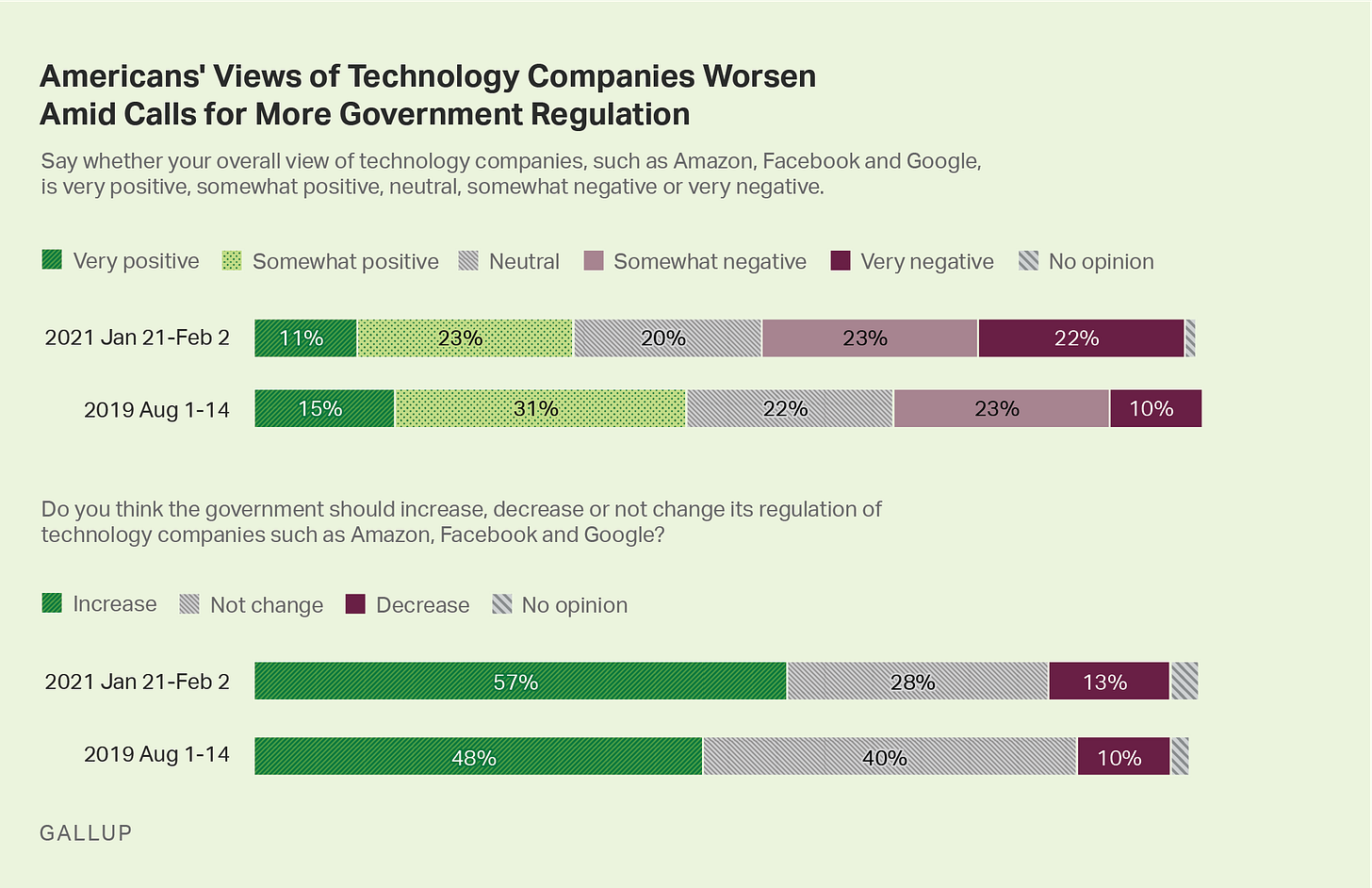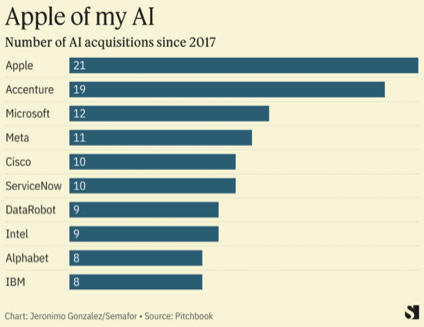Taking a Blow Torch to Big Tech
The concentration of power held by Big Tech threatens democracy
Key Takeaways
1. Big Tech has accumulated too much power in American democracy
2. Big Tech uses acquisitions to neutralize potential competition, especially in the field of AI
3. To combat Big Tech, the government should use antitrust law, pass a Digital Bill of Rights, and enact federal digital election rules similar to campaign finance laws
Related
Around the 17th-century, new entities took shape that spanned the globe and altered history: the Joint Stock Company (JSC). The JSCs, the most well-known being the British East India Company, cooperated closely with imperial European governments to wield immense commercial, political, and even military power over far flung colonies in India, Africa, and the Americas. Their power became so great that some took on the qualities of nation-states.
Today, a new group of Information Monopolies – Amazon, Apple, Meta, Microsoft, and Google (hereafter referred to as Big Tech) – is on track to wield similar power. In 2021, Meta shut off news links in Australia’s Facebook News Feeds to influence government policy[i]. Apple shut off the “Airdrop to nearby users” feature in China at the behest of the CCP during 2022 protests[ii]. The list of geopolitical Big Tech actions in recent years is growing, to say nothing of the political battles in the US over speech.
A plurality of Americans had a negative view of Big Tech in 2021 (45%), increasing by 12 pts from 33% in 2019. Likewise, 57% of American thought the government should increase regulation of Big Tech in 2021, up 9 pts from 45% in 2019.
Figure 1: American attitudes towards Big Tech[iii]
Unlike past battles over monopolies in the US, the effort to constrain Big Tech isn’t about consumer prices, which have broadly fallen with the introduction of technology. The battle with Big Tech is about power, and whether non-democratically elected organizations should have so much. Big Tech’s influence is set to grow even more with the advent of AI. This post is about the legal tools available to fight Big Tech: antitrust law and regulation.
Antitrust
American antitrust law was first passed in the late-19th and early-20th century to combat the “trusts” that had taken over the rail, steel, oil, food and other industries. These firms had cornered their respective markets, controlled the wheels of government, and had raised prices for consumers. Antitrust law has been used in the 20th century against firms like Standard Oil, AT&T, and Microsoft.
Figure 2: The Bosses of the Senate (1889)
Antitrust law should be used to break-up Big Tech and more importantly to block future mergers and acquisitions. The government is currently suing Google and Amazon for violating antitrust laws. The issue is bipartisan, as the Trump DOJ filed the suit against Google and the Biden DOJ is arguing the case in court.
An insidious feature of Silicon Valley has been that Big Tech has had the cash and regulatory approval to buy any start-up that may one day threaten them. Confronted by an existential threat to their business, Meta bought Instagram in 2012 for $1 billion and then WhatsApp for $19 billion in 2014. This trend has continued with AI startups, which decreases competition and ultimately innovation.
Figure 3: Big Tech AI acquisitions
Regulation
But antitrust law will only go so far and Congress must pass new laws to regulate Big Tech. Initially passed in 1789 and amended 17 more times, the Bill of Rights was created to protect certain rights guaranteed to every American. Those rights are now 234 years old and need to be updated for the 21stcentury. We need a Digital Bill of Rights. Florida has one but the topic risks becoming a partisan issue. Many states should pass their own version of a Digital Bill of Rights (Republican and Democratic), the best should be amended to the US constitution. One area where everyone will agree is federal election law: platforms should be required to report any data manipulation on behalf of political parties.
Non-state information powers
AI is the first platform in decades to threaten the search engine dominance of Google. I find conversing with ChatGPT to be superior to a Google search. Google is pouring cash into its own AI chatbot. If Google’s chatbot is unsuccessful, they’ve hedged their bets with investments in the AI startups Runway and Anthropic. Google isn’t the only company investing in AI, Microsoft (Bing search) is investing in OpenAI and Amazon investing in Anthropic. Big Tech spends an immense amount of money lobbying in Washington DC, ensuring laws are written to favor them. They have rigged the game.
Figure 4: Big Tech federal lobbying
Already controlling what Americans see on their feeds, it’s not difficult to imagine Big Tech meddling in elections to support pro-Big Tech candidates. If only the biggest firms have the most powerful AI models, their advantage over rivals will be insurmountable and their power will begin to eclipse nation-states. I’m sure the leaders of Big Tech are patriotic Americans with only good intentions, but no one should have such immense power in a functioning democracy.
In an era where information is power, Big Tech's unchecked influence represents a pivotal challenge to our democratic fabric. While technological advancements have undeniably brought progress and convenience, we must weigh them against the potential erosion of foundational democratic principles. As we stand on the precipice of the AI revolution, it's crucial for policymakers, technologists, and citizens alike to engage in an urgent dialogue. The question isn't just about regulating Big Tech but ensuring that the core tenets of our democracy—transparency, fairness, and representation—aren't overshadowed by monolithic corporate interests. It's time to shape a future where technology serves society, not the other way around.
In case you missed it - Ad Astra online
[i] https://www.wired.com/story/australia-media-code-facebook-google/
[ii] https://www.cnbc.com/2022/11/30/apple-limited-a-crucial-airdrop-function-in-china-just-weeks-before-protests.html
[iii] https://news.gallup.com/poll/329666/views-big-tech-worsen-public-wants-regulation.aspx







